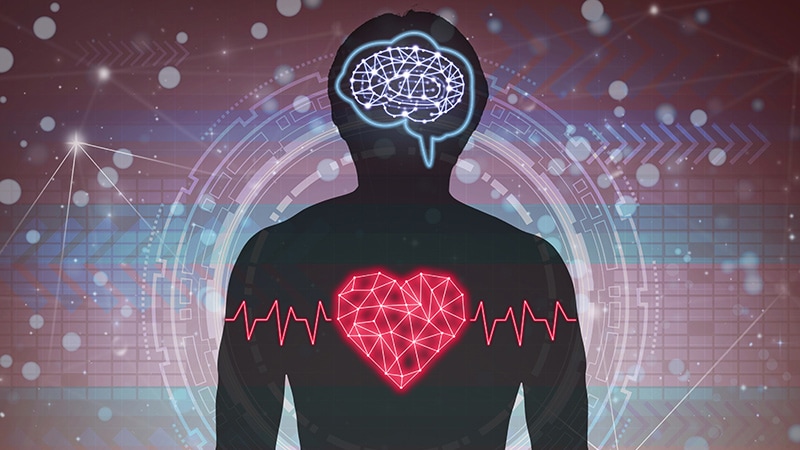
For the first time, researchers have prospectively demonstrated a mechanistic link between brain emotional activity and the heart in individuals with acute myocardial infarction (AMI).
On 18F-fluorodeoxyglucose (18F-FDG) PET/CT imaging performed on patients with AMI, investigators found that brain amygdalar activity, carotid arterial inflammation, and macrophage hematopoiesis were all concurrently enhanced and significantly more active than those in the control group.
Amygdalar activity, as a marker of emotional stress, also correlated well with psychologic measurements of chronic emotional stress and current depressive symptoms in patients with AMI.
"These results raise the possibility that stress-associated neurobiological activity is linked with acute plaque instability via augmented macrophage activity and could be a potential therapeutic target for plaque inflammation in AMI," write Dong Oh Kang, MD, Korea University Guro Hospital, Seoul, and colleagues in their report published online January 18 in the European Heart Journal.
18F-FDG-PET/CT was performed within 45 days of AMI (average, 21 days) in 45 patients (mean age, 60 years) and in 17 age-matched control subjetcs.
The control group comprised individuals with no significant coronary artery disease enrolled from a pool of clinically stable patients undergoing diagnostic evaluation for anginal chest pain.
In 10 patients of the AMI group, repeat 18F-FDG-PET/CT imaging was performed after 6 months to study temporal changes. At this time point, amygdalar activity, carotid arterial inflammation, and bone marrow activity had fallen to levels comparable with control subjects.
18F-FDG is currently the molecular tracer of choice in PET/CT imaging. It is a glucose analogue that accumulates in cells and tissues according to their glucose uptake, which in turn is closely correlated with certain types of tissue metabolism.
In the heart, 18F-FDG has been used as a marker of inflammation based on the observation that inflammatory cells use more glucose than surrounding cells.
Chicken or Egg?
The study builds on previous work done by Ahmed Tawakol, MD, and his team at Massachusetts General Hospital and Harvard Medical School, Boston. Their first study, published in the Lancet in 2017, was retrospective and tested multisystem PET/CT imaging data in patients with stable CAD.
The investigators proposed a pathway of how emotional stress increases hematopoietic activity, macrophage release, and increase plaque inflammation.
More recently, his team published a study that demonstrated that people of lower socioeconomic status (estimated using zip codes) are more likely to have increased activity in the amygdala and upregulated arterial inflammation.
Commenting on the current study, Tawakol said that the findings boost understanding of the brain–heart connection.
"This study extends prior findings in that they also showed an association between the heightened brain activity and the severity of the coronary disease. It's an interesting finding and it strengthens the overall set of associations between activity in the brain, especially the stress portions of the brain, and pathology in the coronary system," he said in an interview.
But like previous studies, this one still doesn't establish causality, he said. "What we really need to understand is the directionality. Yes, they've shown high stress-related neurobiological activity in folks with myocardial infarction. One plausible explanation for this observation is that stress triggered pathological changes, including the generation of high-risk coronary atherosclerotic disease…which sets the stage for a heart attack," he said. "However, could it alternatively be that the experience of the MI led to greater stress-associated neurobiological activity?"
There have been studies showing that stress-associated neurobiologic activity precedes the development of coronary disease and is associated with measures of preclinical disease, he said, but further study of this is needed.
One way to possibly answer this question, according to Marc R. Dweck, MD, Center for Cardiovascular Sciences, University of Edinburgh, United Kingdom, who wrote an editorial that accompanied the article, is to image patients before and after the predictable iatrogenic MI induced by alcohol septal ablation.
Dweck noted a few limitations of the current study, including a relatively long delay between the index event and the imaging study, during which time "the anti-inflammatory effects of drugs such as statins may have had an effect."
Further, the researchers didn't investigate cardiac inflammation at the site of the infarction, "which may have provided additional insights as to the direction of the observed associations," he concludes. "Nevertheless, this study underlines the potential value of multisystem 18F-FDG-PET imaging as a method for interrogating the association of atherosclerotic inflammation with activity in other organ systems."
The study was funded by the Korean Society of Interventional Cardiology and the National Research Foundation of Korea (NRF) funded by the Korean Government. The researchers and Dwerk report no conflict of interest.
Eur Heart J. Published online January 18, 2021. Abstract, Editorial
"activity" - Google News
February 12, 2021 at 01:02AM
https://ift.tt/3rJc61M
Imaging Links Stress Brain Activity and Plaque Instability in AMI - Medscape
"activity" - Google News
https://ift.tt/3ddCXMh
https://ift.tt/2WkO13c
Bagikan Berita Ini














Terpercaya dan berpengalaman di Indonesia
ReplyDeleteDepo/wd hanya 15rb saja.. mari daftar Ajoqq*c0m
Sedia deposit pulsa juga (min 20rb)
Silahkan bermain Tebak ANGKA bersama kami di DEWALOTTO kami juga menyediakan permainan SBOBET, IBCBET dan SABUNG AYAM
ReplyDeletelangsung daftar dan bermain minimal depo hanya 20 rb saja silahkan ADD WA +855 888765575 Terima Kasih admin...:)